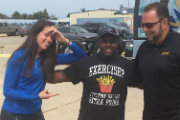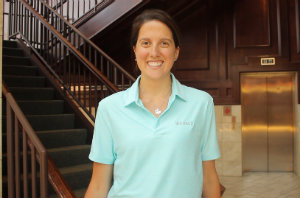Reframe Podcast: Episode 28

On the Road to Wellness: How One Dietitian is Driving Truckers Toward Health

James Loy:
This is Reframe, The podcast from the College of Education, Health and Society on the campus of Miami university in Oxford, Ohio.
In this episode, we speak with kinesiology and health graduate who build a very successful and fulfilling career by taking a pretty unexpected route, one not often associated with professionals her field. But her current role is actually part of a growing trend that is seeing many industries place a higher priority on health and wellness in interesting ways.
(Music Fade)
Anyone who’s driven long distances probably knows how demanding it can be.
Disrupted sleep schedules, a lack of nutritious roadside eating options, increased isolation and prolonged periods behind the wheel can quickly introduce a battery of stressors that make it difficult to stay healthy on the road.
But now imagine doing this day in and day out, all day every day for years on end, and it’s not hard to see why truck driving can be a rather unhealthy profession. And drivers are certainly not alone. Similar issues stretch across the entire industry.
Ali John:
Transportation is a very unique kind of niche spot where they don’t have the same schedule every day. They work in environments that are unique in terms of space and most of the time they don’t get paid unless they are sitting down.
James Loy:
That’s Ali John, she’s a registered Dietitian, Nutritionist and Manager of Corporate Wellness for Werner Enterprises, and a she’s graduate of Miami University’s Didactic Program in Dietetics.
And for those outside the industry, transportation might not seem like the most obvious career path for a dietitian or a nutritionist.
Ali John:
I definitely think that what I do is something that most dietitians wouldn’t see as something that they could do. Dietitians in a hospital is definitely the norm.
James Loy:
But there is certainly a great need for the work she does. On average, truck drivers have high blood pressure, high cholesterol and increased obesity rates. Most also get less than six hours of sleep daily, have less opportunities to stay physically active and they tend to smoke more.
These are just some of the health concerns that John helps alleviate. And it’s a professional role she began pursuing as a dietetic major at Miami University, where she landed a field experience with Verizon, which then led her into the transportation industry, first with CSX, a major railroad company, and now with Werner, one of the world’s largest truckload carriers.
Today, she single-handedly orchestrates a wellness program for more than 12,000 employees. However, until recently, Werner’s wellness program was mostly limited to its corporate headquarters, serving only about 1,400 people.
But since John has joined the company, the program has expanded to include the nearly 10,000 professional drivers who make up most of the company’s work force, and those who also face the serious wellness risks that can not only destroy their health, but also their entire livelihoods.
Ali John:
A lot of that is because – little known facts – but drivers have to be pretty healthy in order to continue to drive. They have to pass a CDL physical and a lot of those physical markers are related to wellness health – so nutrition, exercise, physical activity, sleep patterns and those kinds of things. If they take their CDL physical and it turns out they have diabetes, they can’t drive anymore. So not only is that our lifeline as in Werner as a company, but it is also a driver’s lifeline. If you can’t drive you are not getting paid.
James Loy:
John’s mission is to engage as many employees as possible, and her program spans across a comprehensive campaign designed to help every Werner associate, especially professional drivers, “eat well, train well, drink well, be well and sleep well.”
And to achieve this goal, all Werner drivers receive direct health-related information through an in-cab communication device. She’s implemented “Wellness Wednesdays” that offer quick and simple health tips and a variety of additional quick reference guides that keep other important information continually top-of-mind, especially as it relates to a life on the road.
Ali John:
Wellness is something where you have to meet somebody where they are. So, everybody generally wants to be slightly healthier. They just really don’t know how to do it. So, communication, and communication in a variety of different ways, I think, is really key, and communicating in a way that says, “I understand what you are going through, but here’s how you can get here too.”
James Loy:
For John, there may be many unique considerations specific to the world of transportation. But overall, these are strategies now being embraced across most industries, which is also creating more and more opportunities for new health and wellness professionals everywhere.
Ali John:
So health care costs have gone up and up and Americans, unfortunately, are less and less well with every passing year. All those obesity statistics that say American’s are larger than ever and obesity is a precursor to a lot of these disease states that wellness programs can really help to alleviates. So it is a growing industry for companies to kind of see that healthy people who show up to work and who can work are really important. So the ideal goal of any wellness program, I believe, is to drive down the coast of health insurance for the employer and for the employee. Healthier employees cost less for both the company and to themselves.
James Loy:
And that can be a win-win for everyone, even for John, who gets to see the real difference she makes in the lives of others.
Ali John:
I am really proud when people ask me what I do. I puff up my chest a little bit and tell them that this is what have the great chance to do. But really my biggest pride comes when my associates achieve their goals. When I am dealing or working closely hand in hand with someone who, say, has high blood pressure and they are 100 pounds overweight and they start to see that progress and that success they can have as they get their healthy eating habits and maybe incorporate a little more exercise into their daily lives. And their success is so huge for me. Even through it doesn’t have anything to do with me. It is their personal success and take so much pride in their success. And that is my goal.

